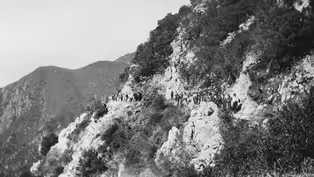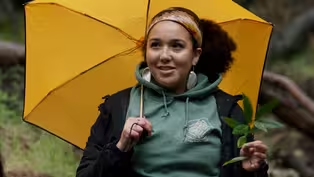
Helping Create Safe Spaces Outdoors for People of Color
Clip: Season 6 Episode 3 | 5m 33sVideo has Closed Captions
WalkGood LA founder Etienne Maurice leads Black Angelenos on hikes for wellness & healing.
Lost LA host Nathan Masters hits the trails of Kenneth Hahn State Recreation Area in the Baldwin Hills neighborhood of Los Angeles with Etienne Maurice, founder of WalkGood LA. This hiking group helps create access to wellness and spaces of healing for Black Angelenos and other people of color through community hikes, which were created in response to the Black Lives Matter movement.
Problems playing video? | Closed Captioning Feedback
Problems playing video? | Closed Captioning Feedback
Lost LA is a local public television program presented by PBS SoCal

Helping Create Safe Spaces Outdoors for People of Color
Clip: Season 6 Episode 3 | 5m 33sVideo has Closed Captions
Lost LA host Nathan Masters hits the trails of Kenneth Hahn State Recreation Area in the Baldwin Hills neighborhood of Los Angeles with Etienne Maurice, founder of WalkGood LA. This hiking group helps create access to wellness and spaces of healing for Black Angelenos and other people of color through community hikes, which were created in response to the Black Lives Matter movement.
Problems playing video? | Closed Captioning Feedback
How to Watch Lost LA
Lost LA is available to stream on pbs.org and the free PBS App, available on iPhone, Apple TV, Android TV, Android smartphones, Amazon Fire TV, Amazon Fire Tablet, Roku, Samsung Smart TV, and Vizio.
Providing Support for PBS.org
Learn Moreabout PBS online sponsorshipMan: Good morning, WalkGood LA family.
How we feeling this morning?
[Cheering] I think we can do a little bit better than that.
Good morning, WalkGood LA family.
How are we feeling this morning?
[Louder cheering] That's right.
Masters: If anyone carries Bragg's torch today, it might be Etienne Maurice.
As the founder of WalkGood LA, Etienne leads a growing entourage of Black Angelenos out into nature.
Unlike Bragg, though, Etienne leads with a greater sense of purpose.
Maurice: I invite you to close your eyes.
I just want you to release everything from the past moment.
Masters: He founded WalkGood LA in the middle of 2020 amid the COVID shutdowns and in the wake of the murder of George Floyd.
Maurice: The intention is for us to come together collectively to heal as not just a community but as a family.
Masters: For him, hiking and other outdoor activities are more than just a way to heal the body and mind.
Before hitting the trails of the Baldwin Hills, I joined Etienne for one of his popular group yoga sessions at Kenneth Hahn State Recreation Area.
Maurice: So step it all the way.
Palms up towards the sky.
Crested lunge.
That right side body bringing that right hand up towards the sky.
Masters: So Kenneth Hahn, it's just like... Maurice: Yeah.
Masters: It's a special place.
Maurice: It really is.
You know, we started over at L.A. High Memorial Park when we first started walking, and L.A. County Supervisor Holly J. Mitchell was a big part in making sure that we were able to hold space here at Kenneth Hahn, and it's very full circle because Kenneth Hahn back in the sixties, you know, being that he was a part of the board of the L.A. supervisor committee, you know, he was the only government official to welcome Martin Luther King to Los Angeles.
Masters: Nobody else would.
Maurice: Nobody else would, and so in the 1960s, Kenneth Hahn was really a pioneer in supporting the civil rights movement, so, you know, what a way to honor his legacy by being here, doing the work that we do.
Masters: Right, and he represented South L.A. Maurice: Yes.
Masters: So--and he actually stood up for his constituents.
Maurice: Yes, he did.
Masters: So obviously when you do yoga, when you go for runs, when you lead hikes, you're doing that for your own good... Maurice: Yeah.
Masters: but are you also trying to say something?
Maurice: Yeah.
I think for a long time, you know, people of color have always been, uh, ostracized or pushed away from doing outdoor activities and wellness activities, and so many of these people have yet to experience it.
Masters: Mm-hmm.
What are some of the hurdles to that?
Maurice: I think what it really comes down to is just exposure and seeing other Black men and women experiencing these activities, and that's, like, representation in its purest form.
You really can't be what you can't see.
Masters: Yeah.
Maurice: And this is something that I always was doing growing up.
You know, my dad would take me on hikes and runs, and my father was the one that really kept me active, and I think after I'd gone through my own traumas and my own experiences, I realized that it was helping me, and then during COVID and during the Black Lives Matter protests, I felt like I needed to share my passion to my community.
Hiking gives me a peace of mind like yoga.
Sometimes, you get so bombarded with the busyness of the city, but then you can just go a few miles outside and find something beautiful.
Masters: So have you ever heard of a man named Paul Bragg?
Maurice: No.
Who's Paul Bragg?
Masters: So he was--way back 100 years ago, he was a L.A. fitness advocate, and he led these giant group hikes into, like, Griffith Park.
He'd lead massive calisthenics sessions.
Maurice: Sounds like a more extreme version of WalkGood.
Masters: I mean, you're part of this tradition of people who are encouraging people to go out into nature, into just, like, the nature around the city, right?
You don't have to go to Yosemite... Maurice: True.
Masters: to get out there.
Maurice: It's right in your backyard, and I think the most important thing about what we do is that people have access to wellness and spaces of healing.
In essence, like, us hiking right now is a practice of healing.
Masters: Mm-hmm.
So you're from Jamaica.
Maurice: My family's from Jamaica.
I was raised in Jamaica.
I spent a lot of my summers in Jamaica with my grandmother.
My grandmother, may she rest in peace, Ivy Ralph--I spent so much time with her during those summers as a kid with my sister, and she would remind us to walk good.
Anytime we left the house, she'd be like, "Walk good, Etienne, walk good, Coco," and, you know, that always stuck with me.
It's so amazing to be able to honor my grandmother's legacy and my Jamaican heritage by reminding my community to walk good when they leave out into the world.
Masters: Yeah.
It comes from your childhood.
Maurice: Yeah, it does, it does, and it's very special to me, you know.
Family is important.
That's the fuel that keeps me going, and my grandmother was a huge part of that.
Video has Closed Captions
Preview: S6 Ep3 | 30s | The hiker-activists who led Angelenos into their hills and onto the trails. (30s)
Native Ancestors Helped Cultivate Today's Hiking Trails
Video has Closed Captions
Clip: S6 Ep3 | 5m 19s | Explore L.A. hiking origins with Tongva artist Samantha Johnson on the Gabrielino Trail. (5m 19s)
Providing Support for PBS.org
Learn Moreabout PBS online sponsorshipSupport for PBS provided by:
Lost LA is a local public television program presented by PBS SoCal

















